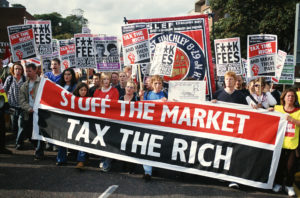Gentrification. Are you pro or anti? Perhaps, if you’re reading this article in a small town with a dilapidated high street, this question may be far from your mind. But if you’re inside the M25, it will loom larger, and will perhaps seem as daft as asking “poverty: are you for or against?”
The release of 2021 census numbers helps to explain why, for millennials in our core cities, the “G” word has become so politically charged. One recent data-blog showed the steeply rising number of residents in professional jobs across London and Manchester. The changes will have been plain to see if you have lived in these places over the past decade, with estate agents popping up on formerly run-down high streets and artisan bakeries appearing in railway arches.
Long-term residents and those on the public-sector frontline often see the shift as a mixed blessing at best. But anxieties are most acute, in my experience, among those doing the gentrifying. The term, after all, describes a moneyed caste pushing out “authentic” locals. Ruth Glass, the formidable Marxist sociologist who coined contemporary usage of the word, described the phenomenon as “displacement”. And many of those doing the displacing — whose politics tend also to be Left-leaning — feel a deep unease about their role.
This guilt is sometimes absorbed internally, but on other occasions it’s deflected elsewhere — at everyone from oligarchs and developers to hipsters and yummy mummies. At the real gentrifiers. And this imagined class is easily illustrated, such as through the Nine Elms Sky Pool, the Dalston Cereal Cafe and the Deptford Job Centre bar. These developments represent the most decadent aspects of modern urban renewal, and encourage people to conclude that it’s something only ever done by other people. (Curiously, the above feelings rarely dampen the appetite for craft beer and sourdough, or spur people to become regulars at the nearest flat-roofed pub. But that’s a debate for another day.)
I am a gentrifier myself. That is: I’m a former young professional who moved to London for work in the early 2010s. I haven’t felt especially flush as I’ve bumped around London’s private rental market over the past decade. But I guess, without realising it, I have been able to pay higher rents than previous waves of residents in the same areas. In this sense, I am “part of the problem”. But I increasingly wonder if this mood of penitence is helpful. This isn’t to downplay the absurdities of the London housing market. Or to deny that such absurdities bring with them an often-ugly social reality, with visible affluence a stone’s throw from homelessness. It’s more that the way gentrification is discussed, as an urban cancer wantonly infecting hearty postcodes, seems very narrow.
I first questioned my attitude to the phenomenon a few years ago, when I heard a parliamentary candidate in an economically struggling town mention the possibilities of gentrification. As the only Londoner in the room, I looked around incredulously, expecting people to be on their feet in anger. Yet the audience gazed back with interest. The candidate did not talk of it as a catch-all solution, and no one broke into spontaneous applause either. But I was struck by the fact that, in an area that had seen its high streets boarded up and its economy ravaged after the 2008 crash, gentrification was not the dirty word it had become in London.
To extend this thought, let’s revive the reportedly abandoned slogan, “levelling up”. The need to rebalance the national economy is acknowledged, in principle, by Left as well as Right. And addressing regional inequality will require, most agree, the attraction of skilled sectors to the places which currently have the fewest opportunities. Hence, the “left behind” towns which successfully level up will be those who persuade their younger populations that they don’t need to move to the nearest metropolis to advance their prospects. If they manage this, then they’ll start to attract skilled workers from elsewhere, too. House prices will rise, as the demand to live in the town increases. And cultural and commercial changes will follow, to cater for the new resident base. The area will begin to gentrify, in other words, once it “levels up”.
Writing in 2017, Dave Hill, a critic of the anti-gentrification zeitgeist, pointed out that ending gentrification in London is not difficult: “Boroughs could stop collecting rubbish…and let packs of dangerous dogs roam public parks, snarling, biting and defecating freely on the grass,” he wrote. “Southwark could close Borough Market. Lambeth could rip out Windrush Square. Sadiq Khan could…launch a campaign called London Is Closed. [This] would soon limit the capital’s attractions, deter foreign investment and eventually bring its population down.” Hill’s argument, acidly put, is that gentrification is a problem of success. Londoners should be careful what they wish for. His contention is underscored by a recent MRP poll, which found that only 11 of the UK’s 367 council areas say their communities have improved in recent years. Ten of these are in — you guessed it — Inner London. The remaining one is Manchester City Council.
At what cost, some might ask? How many people have been pushed out to achieve these polling results? Indeed, even if Hill is right and regeneration is a net positive, you could argue that central London has, in the past 20 years, become a victim of how sought after it is, experiencing “gentrification overkill”. In the late 20th century, boroughs such as Lambeth or Brent benefited from an influx of additional social capital and spending power; from groups who’d once have been too scared or snobbish to live in inner-city areas that had become hollowed out. But, by the 2010s, this had reached a tipping point. If we compare 2011 and 2021 census data for non-UK born populations, we find that much of Inner London is bucking both the national trend and its own history. Boroughs are either getting less diverse or flatlining, with newer waves of migrants settling in parts of the UK where housing is affordable. For Londoners who pride themselves on their city’s multiculturalism, this will be worrying.
Another piece in the puzzle is social class. Gentrification reflects the unromantic fact that more and more Brits do desk jobs. If our cities are gentrifying then that’s partly because our whole economy is, and has been for decades. The true history of the capital is like that of a room repeatedly wallpapered, as its inhabitants move “up” in the world. The road names in the Square Mile — Poultry, Cheapside, Milk Street — reveal a gentrification process going back centuries. And, like the increasing tendency to renounce middle-class identities, the anxiety about gentrification comes from changing material circumstances. The very term “gentrification” insinuates membership of a new nobility, of modern-day squires and duchesses. Few, in a country which aspires to meritocracy, welcome this association. But the reality, however squeamish some feel about it, is that a larger and larger proportion of the population do non-manual roles — and that these people need to live somewhere.
The rising number of middle-class jobs does become an issue if it’s happening faster in some places than others. And this, according to the data-blog cited at the start, is in fact the case. While the blog found that “the professionalisation pattern is clearly visible [beyond] big cities like London”, it also revealed that different areas are professionalising at different speeds. Of the 30 local authorities becoming middle-class quickest, for example, 13 were in Greater London or Greater Manchester. The rest were mostly commuter towns around the capital, or university cities such as Cambridge, Bristol, Warwick and Exeter.
The issue, then, if we’re talking about the increasing number of white-collar jobs, is not necessarily gentrification itself but the uneven spread of gentrification. You could argue — and perhaps there’s an undergraduate essay question to be set on this topic — that the goal of policy-makers should simply be that every UK classroom contains a representative economic and demographic cross-section of the population. If that’s not happening, then governments must intervene.
Does the above question matter, to anyone except gentrifiers already beating themselves up? The debate, I’d say, has wider implications. For one thing, it reveals the extent of geographic polarisation. Very different conversations are happening in different parts of Britain. One analysis I conducted in 2021 looked at parliamentary seats according to various deprivation metrics. The 100 English seats with the highest housing deprivation were almost exclusively in London. The 100 seats with the highest employment deprivation were, in most cases, a long way from big cities. Just eight seats featured on both lists (most of them, interestingly, in Birmingham). To put it bluntly, deprivation in half of the UK means you can’t get a decent house, and deprivation in the other half means you can’t get a decent job.
Another interesting element was party politics. Seats with high housing deprivation tended to swing towards Labour between 2010 and 2019. Constituencies with the fewest barriers to housing shifted Tory — including places which are deprived according to most other metrics. And a recent study by Ben Ansell showed a more specific consequence of this. It estimated, at constituency level, support for house-building — a topic that’s become especially charged over the past year. Enthusiasm was greatest in Labour-held city seats with high housing deprivation: places with transient communities, a precarious rental market, visible street homelessness, high internal inequality and pressure on services thanks to overcrowding. Constituencies where gentrification is, as we like to put it these days, “a thing”. Londoners may feel betrayed by the lack of enthusiasm outside the big cities. But is it really a surprise that those with a completely different experience of the housing market are less convinced about the need to build?
The gentrification debate can feel myopic. To those living in places where well-paid work is in short supply, it may look like navel-gazing from people who’ve had too much of a good thing. Those in its midst, on the other hand, feel the claustrophobia of rising rents, or see their local economy becoming prohibitively expensive over just a couple of years. The fallout from the Liz Truss mini-budget, which affected home owners and private renters alike, has created an intense focus on the housing issue. Young residents in cities have become vocal critics of Nimby-ism by older generations, and planning — not an especially sexy subject a few years ago — has become a wedge issue in some areas. The risk, for mainstream politicians, is that house-building becomes the next big culture war topic, splitting the country along generational or geographical lines.
There is a temptation for politicians to throw their all behind this, attacking the gilded lives of those in one area or another. But those who successfully bridge the electoral divide will be those who identify the thread that links the two. Gentrification is proof not that our authentic urban centres are being invaded, but that exceptionally high levels of regional inequality benefit no one.
Disclaimer
Some of the posts we share are controversial and we do not necessarily agree with them in the whole extend. Sometimes we agree with the content or part of it but we do not agree with the narration or language. Nevertheless we find them somehow interesting, valuable and/or informative or we share them, because we strongly believe in freedom of speech, free press and journalism. We strongly encourage you to have a critical approach to all the content, do your own research and analysis to build your own opinion.
We would be glad to have your feedback.
Source: UnHerd Read the original article here: https://unherd.com/




